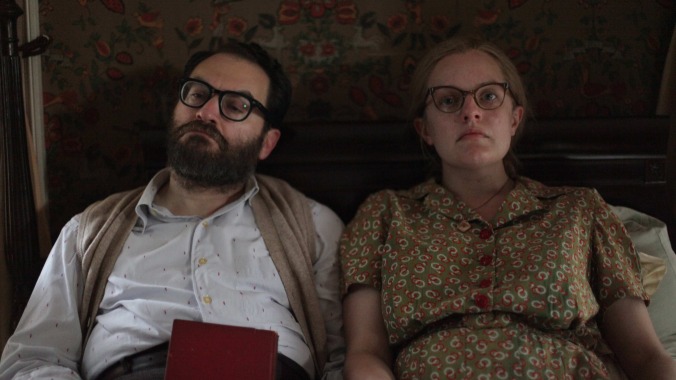Elisabeth Moss finds the dark soul of Shirley Jackson in a fittingly Gothic psychodrama


Suffering has long been characterized as a woman’s lot, canonized in the form of Catholic saints and celebrated in literature and art. (Pablo Picasso merely made it explicit when he said, “Women are suffering machines.”) To defy this edict will bring further misfortune, leaving only two choices: either smile and let your soul die piece by indignant piece, or embrace the darkness and learn to enjoy it. Josephine Decker’s Shirley is about a woman who opted for the latter: Shirley Jackson (played here by Elisabeth Moss), author of high-school staple “The Lottery” and the oft-adapted The Haunting Of Hill House. Mocked by her peers, mistreated by her husband, and burdened by mental illness, Jackson lived with the psychic evils that lurk in her writing. But for Decker, what’s important about Shirley’s misery is how she used it to fuel her work.
Calling Shirley a “biopic” is a bit of a stretch. The details of Jackson’s life have been thrown into a chronological blender and puréed until they’re basically fictional, as they were in Susan Scarf Merrell’s novel of the same name. The writer technically isn’t even the protagonist. That, instead, would be Rose (Odessa Young), the meek young housewife who serves as submissive yin to Shirley’s snarling yang. As the story begins, Rose and her husband, Fred (Logan Lerman), are en route to Bennington, Vermont; there, they plan to stay for a few days with Shirley and her professor husband, Stanley Hyman (Michael Stuhlbarg), whom Fred sees as something of a mentor. They arrive in the middle of a lively bohemian party, with Shirley the brilliant author holding court as Stanley beams from the sidelines. But it doesn’t take long for the toxicity of the older couple’s drunken, manipulative relationship to begin poisoning their houseguests as well.
This is as Gothic of a story as any Jackson wrote, a fairy tale about a beautiful, intelligent young woman who gets tricked by treacherous men into becoming the servant of a dreadful witch. But in this version, the witch is also the heroine’s only friend. Shirley’s sharp tongue and interest in the occult have made her a pariah in Bennington, and Stanley’s fragile ego leads him to treat his more successful wife like a child. But Shirley’s imprisonment in the gloomy farmhouse where most of the film takes place is largely self-imposed. Rose is stuck there by larger societal forces, and the more time she spends with Shirley, the more she learns to twist her unhappiness into morbid fascination. Together, they peer over the edge, titillated by the oblivion that seems to be the only escape from the frustration that defines their lives.
Interdependent characters representing aspects of a whole are a theme in Jackson’s work, and Rose and Shirley similarly embody two versions of 1950s womanhood—Rose the “good” wife, Shirley the “bad” one—literally in dialogue with one another. Even the actors’ performances are complementary, as Moss’ closed-off, defensive scowling contrasts with Young’s sweetness. And the dynamic between the women remains potent, even in a soft middle section where Decker’s impressionistic style muddles Sarah Gubbins’ structured screenplay. “Most young women are fascinated with their own mortality,” Shirley tells Rose at one point, popping a deadly poison mushroom into her mouth. It turns out to be a cruel prank, but in that moment both women feel truly alive—a sensation you won’t get watching your husband flirt with co-eds at a faculty party.
As one might expect from the director of Madeline’s Madeline—another film about creativity as much as anything else—Shirley slowly blurs the lines between this twisted friendship and Jackson’s new novel, inspired by a missing Bennington student. The deeper the author plunges into the project, the more subjective the movie becomes, revealing the dark visions that descend on Shirley in ghastly, expressive bursts. As in her previous work, Decker films her subjects largely in intimate handheld closeup, their complexions grey in the dim light behind heavy curtains drawn against the warm, glowing sunlight outside. Shirley’s soul is so poisoned that the only things that make her happy are sowing chaos and writing, and she can’t do one without the other. It’s a sick coping mechanism, to be sure. But she comes by it honestly.